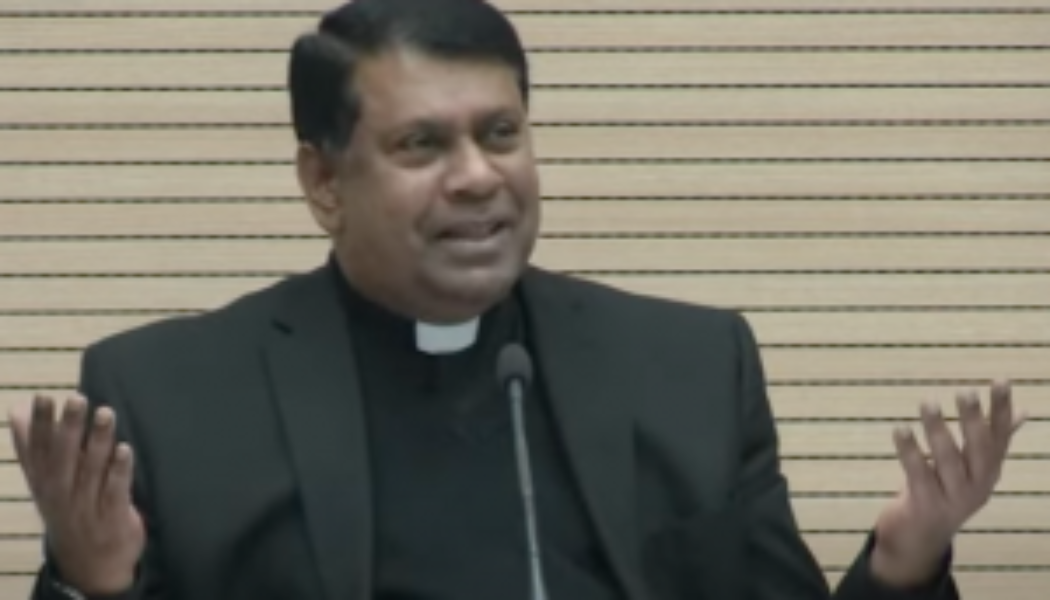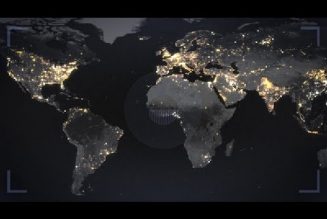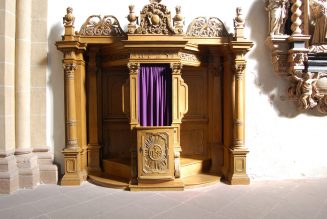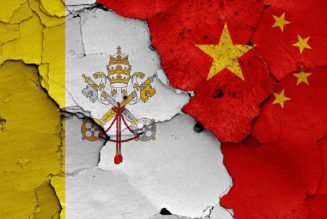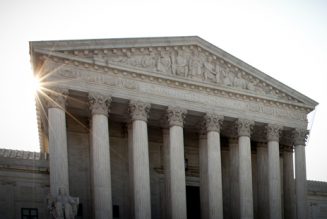
> Italiano
> English
> Español
> Français
> All the articles of Settimo Cielo in English
If you want to receive (or go back to receiving) a notification for every new article, click HERE and subscribe to the Newsletter from Settimo Cielo!
*
On the morning of this November 15, at the Vatican, at the press conference to present the international study conference “Euntes in mundum universum” organized by the dicastery for evangelization, Settimo Cielo posed a few questions regarding China to Msgr. Camillus Johnpillai (in the photo), head of the dicastery.
In his responses, transcribed below from the video recording of the press conference, there is some new information. Concerning in particular:
– the working meeting on China that is held every week at the Vatican between representatives of the dicastery and of the secretariat of state;
– the persistent monitoring of the Holy See’s every move by the Chinese regime;
– the activities concerning the whole of China carried out by the outpost of Vatican diplomacy in Hong Kong.
*
Q: Among the thousand and more dioceses entrusted to the care of the dicastery for evangelization, there those of China. In recent decades, has the dicastery dealt with the appointment of bishops in China, including in the very last few years after the signing of the secret agreement, and if so, how?
A: When it comes to those territories that are under the care of “Propaganda fide,” the dicastery for evangelization, as far as China is concerned the way of dealing with issues is different than it is elsewhere. In China there are more or less 125 dioceses, although technically we call them apostolic prefectures. In terms of staffing, appointments in the dioceses in China, our dicastery, in collaboration with the secretariat of state, has a meeting every week on how to move forward, because here we are in a political situation very different from that of other countries. And the secretariat of state is well informed of the situation, also with reference to the signing of that agreement that we made with the Chinese government. So every decision, above all staffing, appointments, is always made in collaboration with the section responsible for China within the secretariat of state. Even after this agreement, the appointments are going ahead.
Q: So you of “Propaganda fide” also know what is written in the secret agreement…
A: (Smiles) “Secret” is a word that requires a certain clarification. The Chinese government knows, follows everything we do, they are also following this press conference closely, nothing remains secret in the end. But in the political field these are the options they have. What are we to do? We cannot create another option that doesn’t exist. One has to be realistic in order to deal with these governments, not only with China but also with other countries like Vietnam. Each country has its own idiosyncrasies and characteristics, so before going ahead with an appointment, or creating a new diocese, we must always ask if there is any objection on the part of the government. Unfortunately we are very limited in negotiating all of this. The work is going forward, certainly not at speed, but with progress we could call very, very limited.
Q: For the Chinese dioceses, what mapping do you adopt ? That of the Vatican with its over 120 dioceses? Or that of the Chinese government, which has redrawn and merged them, reducing them to just over 90?
A: Regarding the issues of the Church in China, we have a charge d’affaires who is in Hong Kong. Hong Kong is the gateway to greater China. However, here we do not use the expression “nunciature,” but that of “Study Mission Center.” The category of nunciature is politically very dangerous to use, if we use this phrase it goes against the spirit of the agreement. The “mission” is to monitor, follow all these territories closely. Even people from Greater China can come to Hong Kong without difficulty, because politically Hong Kong is part of Greater China. So a Chinese citizen has complete freedom to leave mainland Greater China and arrive in Hong Kong. The people who are in this “center” of ours are able to manage things in a clearer way because they are closer, including geographically, to the local Churches. For them there are many different ways of communicating with each diocese, with each particular Church. So they are well informed. And here we also have staff who know the situation very well. And then we are in this era of “social media,” and this brings the advantage of having a lot of information that is also more up-to-date, because even if we are far away, thanks to this “social media network” we can have a lot of information concerning the life of the particular Churches in China.
.
Join Our Telegram Group : Salvation & Prosperity
